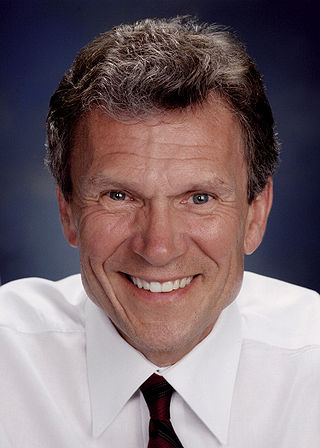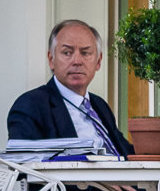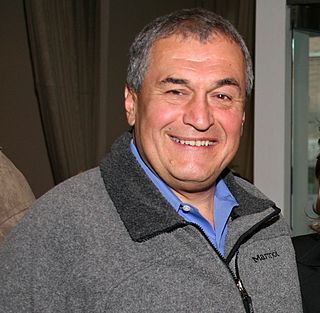Related Research Articles

Thomas Andrew Daschle is an American politician and lobbyist who represented South Dakota in the United States Senate from 1987 to 2005. A member of the Democratic Party, he led the Senate Democratic Caucus during the final ten years of his tenure, during which time he served as Senate Minority Leader and Majority Leader.

The United States Congress is the legislature of the federal government of the United States. It is bicameral, composed of a lower body, the United States House of Representatives, and an upper body, the United States Senate. It meets in the United States Capitol in Washington, D.C. Members are chosen through direct election, though vacancies in the Senate may be filled by a governor's appointment. Congress has a total of 535 voting members, a figure which includes 100 senators and 435 representatives; the House of Representatives has 6 additional non-voting members. The vice president of the United States, as President of the Senate, has a vote in the Senate only when there is a tie.

The Council on Environmental Quality (CEQ) is a division of the Executive Office of the President that coordinates federal environmental efforts in the United States and works closely with agencies and other White House offices on the development of environmental and energy policies and initiatives.

The Friends Committee on National Legislation (FCNL) is a national nonprofit, nonpartisan Quaker organization. As a 501(c)(4) advocacy organization, FCNL and its network lobby Congress and the administration to promote peace, justice, and environmental stewardship. It was founded in 1943 by members of the Religious Society of Friends (Quakers).

The Office of Information and Regulatory Affairs is a division within the Office of Management and Budget under the Executive Office of the President. OIRA oversees the implementation of government-wide policies in, and reviews draft regulations under, Executive Order 12866, the Paperwork Reduction Act, and the Information Quality Act.
Advice and consent is an English phrase frequently used in enacting formulae of bills and in other legal or constitutional contexts. It describes either of two situations: where a weak executive branch of a government enacts something previously approved of by the legislative branch or where the legislative branch concurs and approves something previously enacted by a strong executive branch.

Lanny Jesse Davis is an American political operative, lawyer, consultant, lobbyist, author, and television commentator. He is the co-founder and partner of the law firm of Davis Goldberg & Galper PLLC, and co-founder and partner of the public relations firm Trident DMG. From 1996 to 1998, he served as a special counsel to President Bill Clinton, and was a spokesperson for the President and the White House on matters concerning campaign-finance investigations and other legal issues.

Lobbying in the United States is paid activity in which special interest groups hire well-connected professional advocates, often lawyers, to argue for specific legislation in decision-making bodies such as the United States Congress. It is often perceived negatively by journalists and the American public; critics consider it to be a form of bribery, influence peddling, and/or extortion. Lobbying is subject to complex rules which, if not followed, can lead to penalties including jail. Lobbying has been interpreted by court rulings as free speech protected by the First Amendment to the U.S. Constitution. Since the 1970s, the numbers of lobbyists and the size of lobbying budgets has grown and become the focus of criticism of American governance.

The Honest Leadership and Open Government Act of 2007 is a law of the United States federal government that amended parts of the Lobbying Disclosure Act of 1995. It strengthens public disclosure requirements concerning lobbying activity and funding, places more restrictions on gifts for members of Congress and their staff, and provides for mandatory disclosure of earmarks in expenditure bills. The bill was signed into law by President George W. Bush on September 14, 2007.
John Michael Quinn was an American lawyer, businessman and CNN television commentator.

Gregory Bestor Craig is an American lawyer and former White House Counsel under President Barack Obama, from 2009 to 2010. A former attorney at the Washington, D.C. law firm of Williams & Connolly, Craig has represented numerous high-profile clients. Prior to becoming White House Counsel, he served as assistant to the President and special counsel in the White House of President Bill Clinton, where he directed the team defending Clinton against impeachment. Craig also served as a senior advisor to Senator Edward Kennedy and to Secretary of State Madeleine Albright.

William James Lynn III is a former United States Deputy Secretary of Defense. Before that he was Under Secretary of Defense (Comptroller) and a lobbyist for Raytheon.

Steven J. Ricchetti is an American political aide serving as a Counselor to the President under President Joe Biden. He was the chairman of Joe Biden's 2020 presidential campaign. Ricchetti previously served as Chief of Staff to Vice President Biden during the Obama administration and Deputy Chief of Staff for Operations under President Bill Clinton. In between stints in Democratic administrations, Ricchetti has worked as a lobbyist.
For purposes of U.S. foreign policy, Europe consists of the European Union and non-EU states in Europe.

Kimberly Teehee is a Cherokee attorney, politician, and activist on Native American issues. She is a Delegate-designate to the U.S. House of Representatives from the Cherokee Nation. She served as senior policy advisor for Native American affairs in the administration of President Barack Obama from 2009 to 2012. In February 2020, she was named by Time as one of 16 activists fighting for a "More Equal America."

The U.S. Commission for the Preservation of America's Heritage Abroad is an independent agency of the Government of the United States of America. It was established by Pub. L. 99–83. The law directs the Commission to identify and report on cemeteries, monuments, and historic buildings in Eastern and Central Europe that are associated with the heritage of U.S. citizens, particularly endangered properties. The law also directs the Commission to obtain, in cooperation with the U.S. Department of State, assurances from the governments of the region that the properties will be protected and preserved.
Direct lobbying in the United States are methods used by lobbyists to influence United States legislative bodies. Interest groups from many sectors spend billions of dollars on lobbying.

Anthony Thomas Podesta is an American lobbyist best known for founding the Podesta Group. The brother of former White House Chief of staff John Podesta, he was formerly one of Washington's most powerful lobbyists and fundraisers.

The first presidential transition of Donald Trump began when he won the United States presidential election on November 8, 2016, and became the president-elect. Trump was formally elected by the Electoral College on December 19, 2016. The transition was formerly led by Chris Christie until he and a number of his supporters were replaced or demoted on November 11. The results were certified by a joint session of Congress on January 6, 2017, and the transition ended when Trump was inaugurated on January 20, 2017.

Executive Order 13770, entitled "Ethics Commitments by Executive Branch Appointees," was an executive order issued by US President Donald Trump on January 28, 2017, that directs executive branch employees on a ban from becoming a lobbyist for five years. The order, which reflected an increasingly standard practice of issuing such ethics rules by executive order early in a new administration, borrowed language from similar orders issued by past administrations.
References
- ↑ Landler, Mark. New York Times . Clinton’s Role as a Lobbyist Expands.